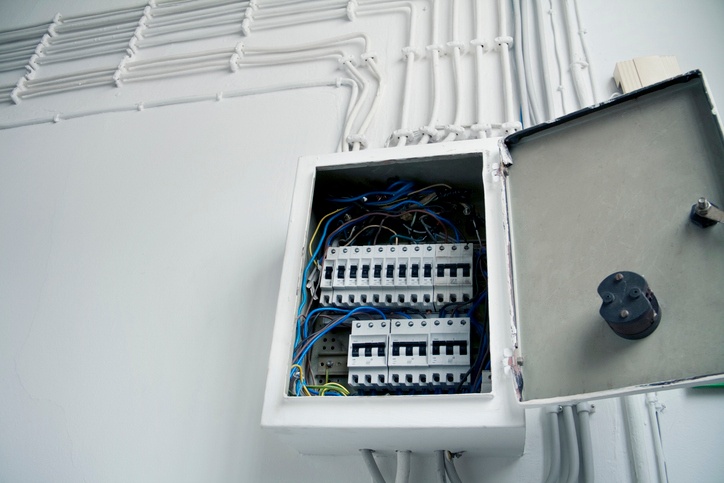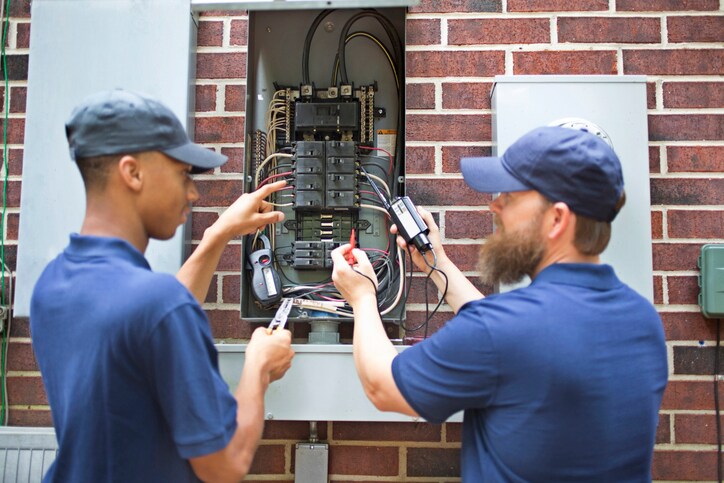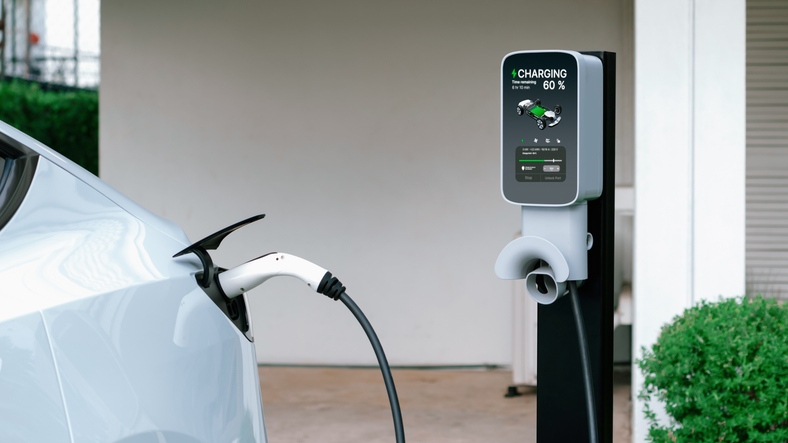-
Benefits of Upgrading Your Electrical Panel
If you live in an older home or are planning new renovations, an electrical panel upgrade might be one of the most important improvements you can make. At Delta Electric, we offer reliable electric panel upgrade services in San Jose, CA, to improve your home’s safety, energy efficiency, and overall electrical performance.
What Is an Electrical Panel Upgrade?
A home electrical panel upgrade involves replacing or enhancing the main panel that distributes power throughout your house. Also known as a breaker box or electrical panel board, this unit manages the flow of electricity to various circuits, ensuring each part of your home receives the appropriate amount of power. Over time, older panels may become outdated, overloaded, or even unsafe—particularly in homes with increased electrical usage due to high-tech appliances, home offices, EV chargers, or HVAC systems. Upgrading your panel helps ensure your electrical system can safely handle current and future energy needs while reducing the risk of outages, surges, or fire hazards.

Understanding Electric Panel Upgrades
The electrical panel is the central hub of your home’s electrical system. It contains breakers that shut off circuits in case of overloads or faults. If your panel is struggling to meet demand or shows signs of wear, it’s time to consider a residential electrical panel upgrade. Key reasons to upgrade include frequent breaker trips, overheating panel or burning smells, visible corrosion or damage, and insufficient amps for new appliances.
Types of Electrical Panel Upgrades
Not every upgrade looks the same. Depending on the age of your home, your electrical usage, and future plans, your electrician will evaluate your system and recommend the most appropriate type of panel improvement. Each type of upgrade is designed to enhance performance, increase safety, and ensure your system can meet modern energy demands. Types of upgrades include:
- Full electrical panel replacement for outdated or unsafe units that may pose fire or shock hazards
- Amperage upgrades (e.g., from 100 amps to 200 amps) to accommodate increased power usage from appliances, HVAC systems, or EV chargers
- Subpanel installation for home additions, workshops, or detached garages that need their own circuit control
- Smart panel upgrades that provide remote monitoring, energy tracking, and the ability to manage circuits via smartphone or tablet
Advantages of Residential Electrical Panel Upgrades
Upgrading your home’s electrical panel significantly improves the overall performance and safety of your electrical system. Modern panels use updated, code-compliant equipment that enhances protection against electrical hazards. They also provide the capacity needed to support high-powered devices like HVAC systems, ovens, and electric vehicle chargers. With a properly sized and upgraded panel, your circuits experience less strain, leading to better energy efficiency. As a result, you’re also less likely to deal with common issues like flickering lights or frequently tripped breakers.
The Impacts of Panel Upgrades
An electric panel upgrade impacts your entire electrical system. It ensures that power is distributed safely and consistently, preventing fires, shocks, and other hazards. It also prepares your home for future upgrades, such as solar panel installations or major renovations that require increased power capacity. By upgrading your house electrical panel, you reduce risk and ensure long-term dependability.
Top Benefits of Upgrading Your Electrical Panel
There are clear reasons why a home electrical panel upgrade is a smart investment. As households rely more on modern appliances, smart devices, and energy-efficient systems, older panels often struggle to keep up. A panel upgrade ensures your home can safely handle today’s electrical demands while preparing for future needs. Here are some top benefits:
- Increased home value with modern infrastructure. A new panel makes your home more attractive to buyers and can boost resale value.
- More reliable electrical service for modern appliances. Say goodbye to tripped breakers and power issues when using multiple devices.
- Lower insurance premiums for updated systems. Upgraded panels are safer, which may qualify you for reduced insurance rates.
- Ability to expand or remodel with fewer electrical limitations. A new panel provides the capacity needed for additions, EV chargers, or renovations.
- Peace of mind knowing your home is safer and up to code. Modern panels meet current safety standards and reduce the risk of electrical hazards.
Schedule Electrical Panel Replacement in San Jose, CA
Whether you’re experiencing issues with your current system or planning ahead, Delta Electric offers trusted electrical panel replacement and upgrade services across San Jose and the surrounding areas. We’ll evaluate your current panel, recommend the right solution, and complete the work with safety and efficiency in mind. Fill out our contact form or call us today to schedule your house electrical panel upgrade with one of our experienced technicians.
-
Signs You Might Need Home Electrical Repair Services
Maintaining a safe and functional home electrical system is essential for every household. At Delta Electric, we provide professional residential electrical services in San Jose, CA, to help homeowners identify and resolve electrical issues before they become serious hazards. If you’re unsure whether you need a home electrical repair service, this guide outlines the most important signs to watch for.
What Are Home Electrical Repair Services?
Home electrical repair services involve diagnosing and fixing problems within your home’s electrical systems. This includes everything from wiring issues and faulty outlets to circuit breaker malfunctions and appliance problems. Skilled electricians are trained to identify potential hazards, restore proper function, and prevent future complications through accurate troubleshooting and repair. Whether it’s a minor inconvenience like a flickering light or a major safety concern such as exposed wiring or recurring power loss, working with licensed professionals ensures your home meets current code requirements, operates safely, and remains energy-efficient.

Recognizing Electrical Dangers in the Home
Electrical issues can be dangerous if left unaddressed. Fires, shocks, and appliance failures are just a few of the serious risks that can arise from neglected electrical problems. Flickering lights, buzzing outlets, frequent breaker trips, or a burning smell near switches are all early warning signs that should never be ignored. Knowing how to spot these issues early can help prevent costly damage and protect your home and family from harm. Always treat persistent or recurring electrical problems as red flags and consult a licensed electrician right away for a professional assessment.
The Importance of Home Electrical Repair Services
Electrical work should never be taken lightly or attempted without proper training. Mistakes can lead to more serious damage, void your warranties, or even create hazardous conditions in your home. Hiring a professional ensures that all installations and repairs meet code requirements, that electrical issues are accurately diagnosed, and that the risk of fire or electrical shock is significantly reduced. Most importantly, it provides long-term reliability and peace of mind. Attempting to handle electrical repairs on your own, without the right expertise, can ultimately do more harm than good.
Signs Your Home Needs an Electrical Repair
If your home is showing any of the following signs, it’s time to contact a licensed electrician. These symptoms can indicate faulty wiring, overloaded circuits, or aging components that require attention. Some common indicators include:
- Flickering or dimming lights throughout the house
- Burning smells or discoloration near outlets or switches
- Frequent circuit breaker trips or blown fuses
- Buzzing noises from electrical panels or outlets
- Sparking when plugging in appliances or devices
- Warm or vibrating wall plates
Common Scenarios Requiring Residential Electrical Services
Even if your system seems to be working, certain life events or changes in your home may warrant an electrical evaluation. Preventive electrical inspections are also useful during home sales or major renovations. You may need residential electrical services when:
- You move into an older home with outdated wiring.
- You upgrade appliances and need additional capacity.
- You remodel a room or add new outlets and lighting.
- You install new HVAC or entertainment systems.
- You notice inconsistent performance.
Electrical Repair Services for Home Improvement Projects
Home improvement projects often involve some level of electrical work, whether you’re undertaking a small remodel or a major renovation. Tasks like installing new light fixtures, upgrading outdated electrical panels, rewiring rooms, or adding power outlets for outdoor living spaces are more than just cosmetic improvements—they require technical expertise to ensure everything is safe, code-compliant, and efficient. Working with a qualified, licensed electrical team is crucial. An experienced electrician will not only make sure your electrical system supports your renovation goals but also help future-proof your home by integrating smart technologies and energy-efficient solutions. Whether you’re updating your kitchen, finishing a basement, or enhancing your outdoor areas, skilled electrical professionals ensure your home electrical repairs and upgrades are safe, seamless, and built to last.
Call Delta Electric for Home Electrical Repair in San Jose, CA
At Delta Electric, we specialize in all aspects of home electrical repair and service. Whether you’re addressing urgent issues or planning a home upgrade, our experienced team is ready to help with fast, reliable solutions. Fill out our contact form or call us today to schedule a home electrical repair service with one of our trusted professionals.
-
Tips for Selecting an At-Home Electric Car Charger
Electric vehicles are becoming more common across the country, and homeowners in San Jose, CA, are investing in home electric car charger installations to keep up with the trend. At Delta Electric, we help our customers install EV chargers at home that are efficient, reliable, and compatible with their driving habits. If you’re considering a home charging station for electric cars, understanding your options can save you time, money, and stress.
What Is a Home Electric Car Charger?
A home electric car charger, also known as an EV charging station, allows you to recharge your electric vehicle from the comfort of your driveway or garage. Instead of relying solely on public stations, you gain the convenience of starting each day with a full battery. Home EV charging stations come in a variety of styles and power levels. Some plug into standard outlets (Level 1), while others require special installation and offer faster charging (Level 2). The right solution depends on your vehicle’s battery capacity, how often you drive, and your household’s electrical setup.

What Is Smart Charging?
Smart charging refers to EV chargers that connect to your home’s Wi-Fi, allowing you to control or schedule charging remotely. This technology is ideal for anyone looking to manage energy use and reduce costs more effectively. With smart charging, you can monitor your energy usage through a mobile app, take advantage of off-peak utility rates by scheduling your charging times, and receive real-time updates about battery levels or any system issues. Altogether, smart charging helps you optimize your EV charging experience while also lowering your carbon footprint.
What Are the Benefits of Installing an EV Charger at Home?
Whether you’re a daily commuter or weekend driver, electric car charging makes it easy to stay powered up, and installing a home charging station for electric cars provides a range of benefits. For most EV owners, it’s one of the most practical upgrades they can make. Advantages include:
- Convenient overnight charging from your own home
- Savings compared to public charging stations
- Increased home value and appeal to future buyers
- More predictable and consistent charging performance
Tips for Selecting an At-Home Electric Car Charger
Choosing the right charger is essential for safe and effective use. There are several important factors to keep in mind when exploring your options, and consulting with a licensed electrician can help you identify what works best in your home. To select the best charger for your needs:
- Check compatibility with your vehicle model
- Consider charging speed (Level 1 vs. Level 2)
- Look for smart features such as Wi-Fi or app connectivity
- Determine if you need a portable or wall-mounted unit
- Evaluate your home’s electrical system for upgrade needs
How to Choose the Right Home EV Charging Station
Beyond features and speed, it’s important to consider your lifestyle and how frequently you need to charge your vehicle. A reliable electric car charger should complement your daily driving habits. For example, if you drive long distances each day, a charger that can deliver quick overnight charging may be essential. If your EV is a secondary vehicle used only part-time, a slower, more budget-friendly option might suffice. If you anticipate charging multiple EVs from the same unit in the future, you’ll want a charger with the capacity to handle that demand. Thinking through these factors will help you choose a solution that’s both efficient and cost-effective.
What’s the Difference Between AC and DC Chargers?
AC (alternating current) chargers are most common in residential settings and include both Level 1 and Level 2 options. DC (direct current) fast chargers are typically found in commercial or public stations and are capable of charging an EV in under an hour. AC chargers are more affordable and easier to install, while DC chargers require special infrastructure and are better suited for high-volume, rapid charging needs. Home installations almost always use AC for practicality and cost-efficiency.
Install a Home EV Charging Station in San Jose, CA
If you’re ready to install an EV charger at home, the professionals at Delta Electric are here to help. Our licensed electricians provide expert guidance on product selection, installation, and long-term maintenance. Interested in upgrading to a home electric car charger? Fill out our contact form or call us today to speak with our team and schedule your EV charger installation.
RECENT POSTS
categories
- Uncategorized
- Delta Electric
- Commercial Electrical
- Residential Electrical
- Electric Circuits
- Dedicated Circuits
- Circuit Breakers
- Electrical Panels
- Electrical Wiring
- Safety Inspections
- copper wires
- Electrician San Jose
- Trained Electricians
- Electrical Services San Jose
- Malfunctioning Electrical Outlets
- Circuit Breaker
- Grounding
- safety
- Flickering Lights
- Arc Fault Breakers
- electrical system
- Aluminum Wiring
- Circuit Interrupters
- House Surge Protection
- Zinsco Panel Warnings
- Wiring Conversion
- GFCI outlet
- professional electrician
- Knob-and-Tube Wiring
- modern home electrical system
- Fuses
- Electric Car Charger
- Electrical Repair
Archives
2025
2024
2023
2018
2017
- December (4)
- November (4)
- October (5)
- September (4)
- August (4)
- July (4)
- June (4)
- May (4)
- April (4)
- March (3)
- February (4)
- January (3)
2016
- December (3)
- November (4)
- October (4)
- September (4)
- August (4)
- July (4)
- June (4)
- May (4)
- April (4)
- March (4)
- February (4)
- January (4)
2015
- December (4)
- November (4)
- October (4)
- September (4)
- August (3)
- July (4)
- June (4)
- May (3)
- April (4)
- March (4)
- February (2)
2014
- December (3)
- November (4)
- October (4)
- September (6)
- August (2)
- July (3)
- May (2)
- April (1)
- March (2)
- February (1)
- January (1)

